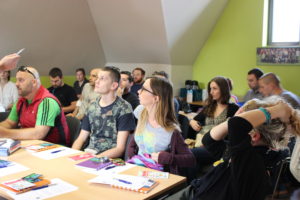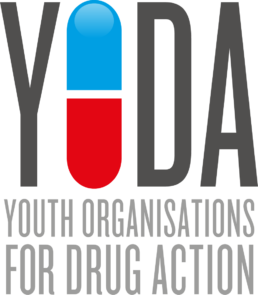On September 1-4 2016, 29 members and activists from YODA organizations gathered in Antwerp for workshops on work with young people using drugs problematically, and issues related to this topic, such as homelessness and social services.
Our host for this meeting was Free Clinic, operating in Antwerp since the 1970s, and its specialist center Plug-INN, that is focused exclusively on people under 26 years old. Free Clinic and Plug-INN provide variety of services, ranging from needle exchange to medical and social assistance, and includes opioid substitution treatment.
Participants came from 11 different countries and organizations: Free Clinic from Belgium, CEPA from Romania, SSDP UK from United Kingdom, Juventas from Montenegro, HIDE from Hungary, Re Generation from Serbia, SIN from Poland, Aksion+ from Albania, Liberty 420 from Bulgaria, Labirynth from Kosovo and HOPS from Macedonia.
On the first day of workshops we learned about the Free Clinic and Plug-INN activities in Belgium, the current drug situation (especially from the perspective of young people) in this country and city of Antwerp, drug laws, and challenges they face in their everyday work. While the Free Clinic has been around for decades, the Plug INN center was started as a separate project just few years ago. Both clients and workers of Free Clinic recognized the need to create a uniquely tailored programme and services center for young drug users for two main reasons: young users would discriminate against older ones, considering themselves and their situation to be much different (“yes, we use drugs, but we are different than these old guys – we have plans, we are not that hooked, we use but we are living our lives”), while at the same time older users sometimes had negative influence on the young clients e.g. introducing them to their dealers.

Plug INN center is located in downtown Antwerp, close to the former red light district. Until a few years ago this area was well known for its open drug scene, which had since dispersed all over the city due to police crackdowns and gentrification. It is open for people under 26 years old, and offers services such as counseling, needle and other drug paraphernalia exchange and medical support provided by doctor.
Later on that day we had a workshop on work with young people using drugs problematically, where – after being divided into working groups – we simulated working at a drop-in center accepting clients having specific problems that we had to solve.
We discussed the situation in our respective countries (no group had two people coming from same country), and discussed what type of support could we provide in real life versus an ideal situation in which there are no legal barriers, funding is unlimited and every organization has as many perfectly trained and experienced employees as it wants. This way we wanted to determine similarities and differences in problems faced by each country. Needless to say, law, resources and capacity were named most often.
The second day of workshops started with an alternative city tour organized by Buro Aktief, another project of Free Clinic, where current and former clients show parts of the town that had once been famous for drugs, alcohol, sex work and nightlife. During the tour we discussed approaches to the drug and drug related issues in the urban environment, especially outreach work.
After lunch we had YODA strategic meeting, where we discussed our plans for the next year, both as a network and individual organizations, so we could see how we can get involved and support each other’s work. These plans include continuation of similar workshops in the coming years, aiming to increase the professional competences of people working in YODA member organizations; major meetings with international policy makers and representatives of key international institutions involved in European and global drug policy; participation in all the important international events such as UN Commission on Narcotic Drugs session and EU drug consultations and expansion of our partyworking services at festivals around Europe.
Later we conducted workshops on outreach: each group was supposed to cover a different part of the imaginary city of Yodaburg, where different groups of drug users would hang out representing possible differences in needs. With a limited budget participants had to choose when their outreach should start, how often it would take place each week, and what professionals should be on it – each having a different salary (you need to decide where you send alcohol counselor and where needle exchange worker will be more useful). In contrast to the workshops on the day before, here we needed to operate in a realistic situation in which resources are limited, to work out how we can utilize them most effectively.
Soon we will be publishing more professionally-focused summary of all the activities from this workshops, where you will be able to learn what are the existing approaches and ideas for new and better solutions to the topics that we discussed in Antwerp.
On Saturday morning we finished our meeting with evaluation, after which participants headed back to their countries all across Europe. It was a great experience for us as organizers and we hope all the participants enjoyed it as much as we did. Huge shout-out to Free Clinic and Plug-INN for being such a wonderful hosts, and all the other partner organizations that helped to facilitate particular modules of this workshop. We can’t wait to see you all in Warsaw and Budapest soon!
This project is supported by European Union Erasmus+ program
This project is supported by Open Society Foundations Global Drug Policy Program

